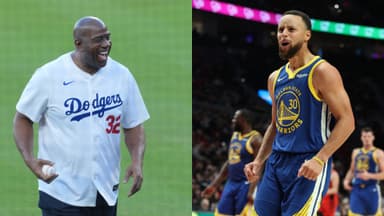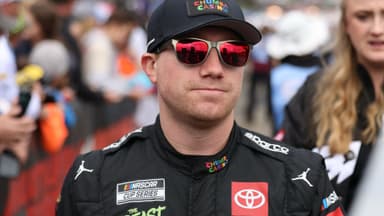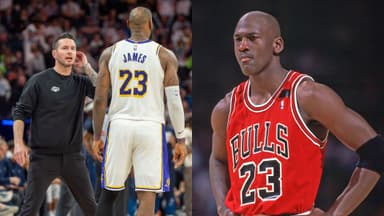Magic Johnson is undoubtedly one of the biggest reasons the modern NBA has reached the heights it has today. His rivalry with Larry Bird financially saved the league, and the showstopping flashiness of his ‘Showtime Lakers’ helped make basketball a household name. He is a beloved legend today, but things were very different back in 1991. His HIV diagnosis ostracized him from the rest of the league.
Advertisement
Former Heat center Rony Seikaly, who was in his third year in the league when Magic’s diagnosis went public, recently spoke about the impact the announcement and Magic’s subsequent retirement had on the NBA. Most people, he explained, couldn’t fully comprehend what had happened. That fear made them stay away from the Lakers legend.
At the time, people in general didn’t know much about HIV or how it was transmitted. Some were even afraid that just being touched by Johnson could infect them. It’s sad, but that’s how the world was back then, before people were truly knowledgeable about the disease.
“So basically, when Magic retired because of HIV, a lot of the players and a lot of the people that didn’t really understand the disease, everybody just didn’t want to be around Magic,” Seikaly revealed. “Nobody knew how you get infected, if you get infected by touch, so all the players kinda pushed away, and for me growing up, Magic Johnson was the NBA, so watching all the players distance themselves from Magic was really not something I was proud of.”
Seikaly told his interviewer that, during the final stages of Magic’s first stint in L.A., he approached him one day and said he wanted to scrimmage. He made it clear that he wasn’t going to take it easy; he would push and shove him to the limit. Seikaly revealed that Magic instantly opened up to him, as no one else in the league had paid him much attention since the diagnosis went public.
To be fair to others, even Magic himself didn’t have much information about the disease. As he revealed to Gayle King in 2021, he had to first learn about HIV before he could talk to others about it. Only then was he able to communicate with people and assure them that he wasn’t dangerous to be around.
“I had to really learn a lot about the disease, HIV, as well as AIDS. I had to make sure that I was open-minded enough to ask a lot of questions, go get a lot of information from different people,” he said.
While most of the league was busy pushing Magic away, one player publicly stated that he didn’t care about the diagnosis and supported him throughout it all. Dennis Rodman, one of the NBA’s most bizarre and unpredictable characters even to this day.
After Karl Malone expressed hesitance about playing alongside Magic in the 1992 All-Star Game, the Lakers guard became skeptical about whether other players would continue to support him through his battles. So, when he returned to the league in 1996, Rodman made one thing clear: he wasn’t going to go easy on Johnson.
“Who cares if he’s got HIV, measles, cancer, whatever?” said Rodman in 1996, per Sports Illustrated. “I’m going to slam him anyway, and anybody who’s got any balls will do the same thing.”
Rodman had his own way of helping Magic through that difficult period in his life, and his teammate Michael Jordan had his own. Jordan’s support came in the form of a brief mention during a 1992 Playboy interview, where he revealed how he first learned of the news.
How Michael Jordan reacted to Magic’s HIV news
Jordan was on top of the world in 1992. He was coming off his first-ever title win, chasing a second, and seemingly could do no wrong. He would go on to win his third MVP that season as well. But in a Playboy interview that year, Michael opened up about how the announcement of one of his closest friends’ retirements affected him.
Jordan received the news before the rest of the world, courtesy of a call from Magic’s agent, Len Rosen. MJ then called Magic and told him that he had taken the news of his impending retirement and HIV diagnosis even harder than the Lakers legend himself. Speaking to the interviewer, Jordan recalled that Rosen had given him Magic’s number, and he decided to call him directly.
“I called him at home. He was as calm as you and I. I said to him, ‘Damn, you’re calmer than I am. I’m about to drive off the road.’ He said, ‘I just want you to continue with your life. I’m going to be fine, my baby’s going to be fine, my wife is fine,” Jordan revealed.
Jordan’s subsequent answers to questions about HIV made it clear that he supported Johnson and was doing his part to help destigmatize the disease. When asked whether he would be surprised if more NBA players came forward with similar diagnoses, Jordan simply said no.
“One of your prime personalities has gone public and said he got it through promiscuity. He wasn’t the only promiscuous athlete. I’m pretty sure he won’t be the last,” he said.
Today, Johnson is revered as one of the most influential figures in helping to destigmatize the disease in the eyes of the public. His Magic Johnson Foundation, established soon after his retirement, focuses on educating communities about HIV/AIDS and ensuring that those affected receive proper care and support, something he was fortunate enough to have access to in the 1990s.








